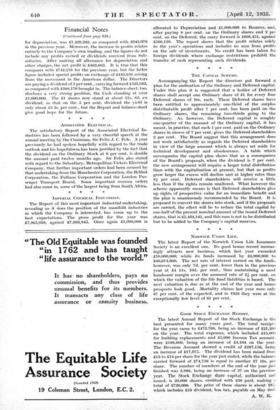THE CAPITAL SCHEME.
Accompanying the Report the directors put forward a plan for the unification of the Ordinary and Deferred capital. Under this plan it is suggested that a holder of Deferred shares shall accept one Ordinary share of £1 for every four Deferred shares of 10s. each. These Deferred shares have been entitled to approximately one-third of the surplus distributable profit after 7 per cent. has been paid on the Ordinary shares, the remaining two-thirds going to the Ordinary. As, however, the Deferred capital is roughly one-quarter of the amount of the Ordinary capital, it has meant, in practice, that each 1 per cent. paid on the Ordinary shares in excess of 7 percent. gives the Deferred shareholders 2 per cent. The Board suggest that this arrangement does not work satisfactorily as regards the Deferred shareholders in view of the large amount which is always set aside for technical development and obsolescence. A table which accompanies the capital plan shows that as a consequence of the Board's proposals, when the dividend is 7 per cent. the new arrangement will require a larger total distribution than with the capitalization at present, but that as profits grow larger the excess will decline and at higher rates than 91 per cent. Deferred shareholders will receive a little less than if the rights remain unaltered. What however the scheme apparently means is that Deferred shareholders give up rights of prospective value for an immediate benefit and the plan is unanimously recommended by the Board. It is proposed to convert the shares into stock, and if the proposals are carried, the effect will be to reduce the total capital by one-half of the present nominal amount of the issued Deferred shares, that is £5,434,141, and this sum is not to be distributed but to be added to the Company's capital reserves.


















































 Previous page
Previous page